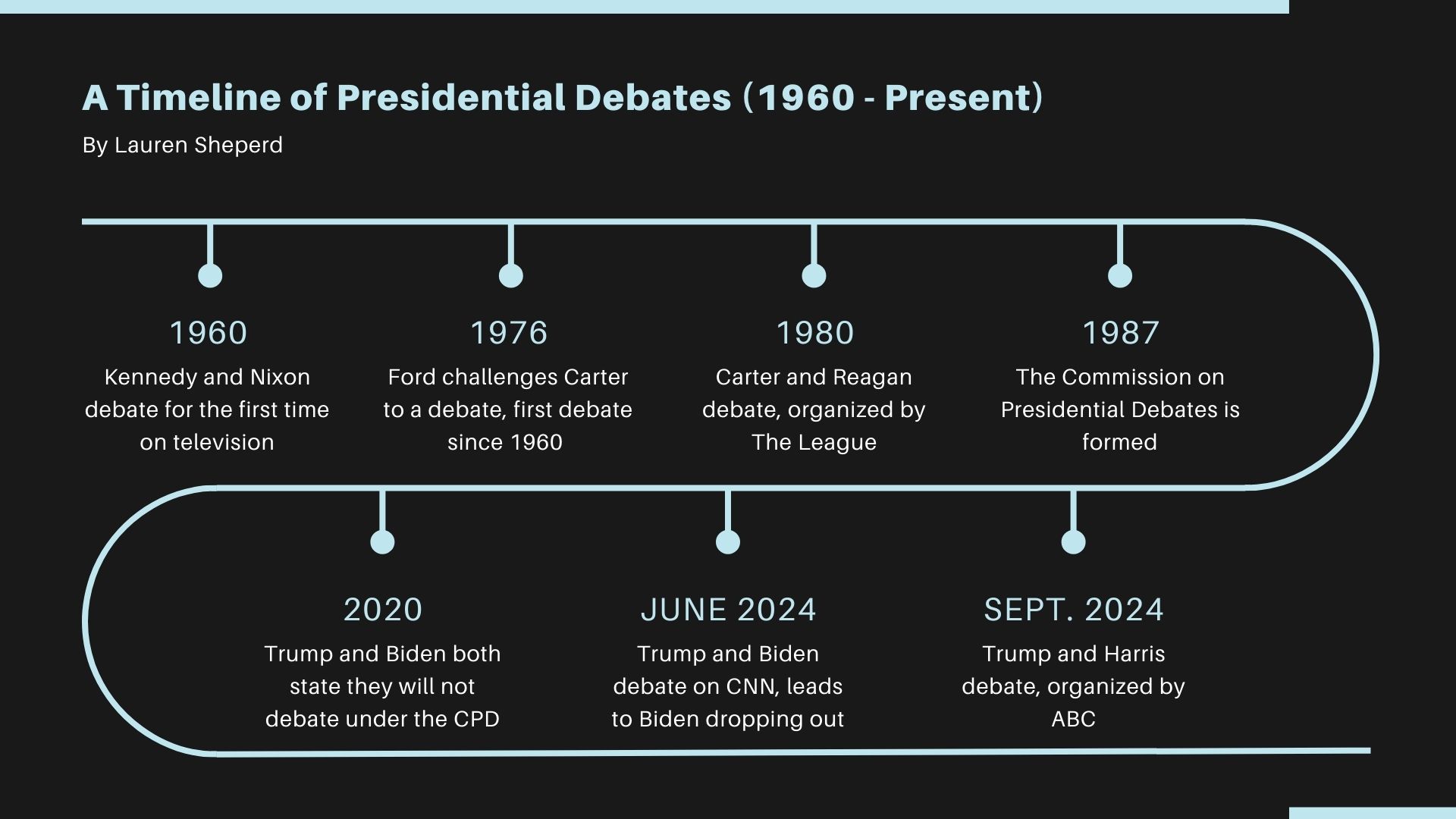The Commission on Presidential Debates not involved for the first time in 36 years
Former President Donald Trump and Vice President Kamala Harris will likely not debate each other again prior to the November 5 general election, going against all other precedents set by past presidential election cycles.
So far, Harris and Trump have only had one formal debate in Philadelphia, on September 10, though Trump did debate President Joe Biden on June 27 in Atlanta before Biden dropped out of the race in July.
Since 1988, there have been three presidential debates and one vice presidential debate in each election, run by the nonpartisan Commission on Presidential Debates (CPD). These debates were typically held at colleges and universities.
“THERE WILL BE NO THIRD DEBATE!” Trump wrote on his Truth Social page on September 12. At a rally in North Carolina the same day, Harris said, “We owe it to the voters to have another debate.”
The first debate this general election cycle between Trump and Biden was the first to take place not under the CPD in decades. Instead of working with the commission, the candidates negotiated with news networks to host and moderate the debate. The debate between Trump and Biden was hosted by CNN, and the debate between Trump and Harris was hosted by ABC. All major news outlets still covered the debate live.
David Zarefsky, professor emeritus of argumentation and debate at Northwestern University, said debates from this election cycle have already had profound consequences. “The [first] debate essentially knocked Biden out of the race,” he said. Most analyses to come from the first debate have been about how weak Biden looked, rather than the policy discussed.
Biden and Trump both refused to participate in CPD-sponsored and -run debates, leading to its demise after 2020. Though the debates are run differently now, they are still vital to a free democracy. “I don’t think it changed anything in how they contribute to the knowledge of the public,” Zarefsky said.
The first modern, televised presidential debate took place in 1960. The participants were Democratic Senator John F. Kennedy and Republican Vice President Richard Nixon. This debate is famous for swaying votes to Kennedy after he gave a much better television performance than Nixon. According to the Purdue University Department of History, voters were more likely to vote for Kennedy if they watched the debate on television and more likely to vote for Nixon if they listened to the debate on the radio.

Following the debate between Kennedy and Nixon, there was no debate until 1976, when the incumbent president – Gerald Ford – challenged Democratic nominee Jimmy Carter to a debate. At the time, Ford was close to 30 points behind in the polls and had not been elected to the presidency, as he took over when Nixon resigned. This was when the League of Women Voters created the structure that would be followed for decades: three presidential debates and one vice presidential debate.
The CPD officially took over from the League in 1988, where they followed the 1960 format for debates by having a panel of journalists ask the questions. In 1992, the CPD began experimenting with other formats based on academic research.
“The commission would set out the rules, would pick the dates, the locations and the moderators,” Zarefsky said. “The other thing the commission would do is it sponsored research on the effects and effectiveness of the debates, which attracted a fair amount of academic interest.”
The CPD focused on making debates a fundamental part of elections and even inspired debate commissions in other countries. In a statement released by Debate International – a “global resource on candidate debates” in 40 countries – members pitched their support of the CPD.
“The Commission [CPD] establishes standards for integrity and professionalism that inspire debate organizers across the globe,” the statement reads. “The decision to continue with the CPD debates will strengthen democracy in the U.S. and will send a powerful global message about democratic integrity and participation.”
The main purpose of the presidential debates is to inform voters about policies and values of the candidates told directly to the American people. However, the number of policies being discussed changed significantly when Trump came on the scene almost a decade ago.
This does not change the importance of the debates, according to Zarefsky. “They show the same things: how the candidates think, how they reason in difficult situations, how they defend themselves,” Zarefsky said.
As of right now, Harris has agreed to a town hall hosted by CNN on October 23. The same invitation was extended to Trump, but he declined.
Header: President Gerald Ford and Jimmy Carter meet at the Walnut Street Theater in Philadelphia to debate domestic policy during the first of the three Ford-Carter Debates by David Hume Kennerly taken on September 23, 1976 in the public domain.




NO COMMENT